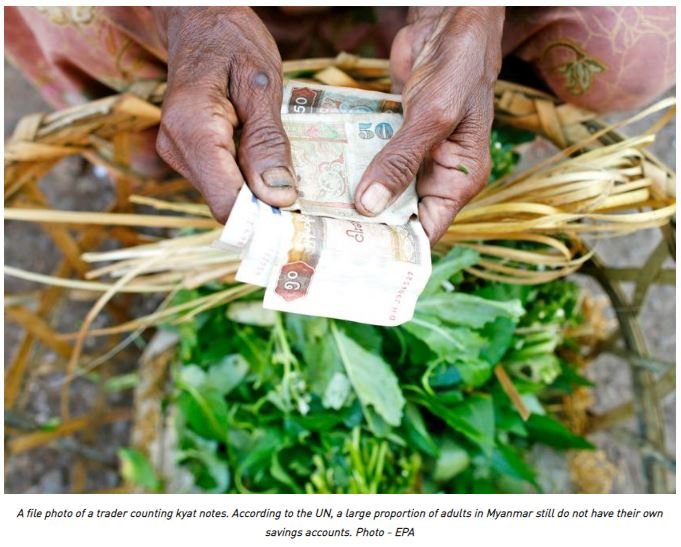Digitalisation will boost savings culture in Myanmar: expert
The prevalence of cash transactions and smart phone ownership in Myanmar provides an attractive opportunity for the spread of digital savings services to underserved or unserved households, a UN expert says.
UN Capital Development Fund (UNCDF) Country Coordinator for Myanmar Paul Luchtenburg said this during a talk last Saturday at a forum held in conjunction with World Savings Day.
World Savings Day was established on October 31, 1924, during the 1st International Savings Bank Congress (World Society of Savings Banks) in Milan, Italy.
The Annual World Savings Day Forum, being held in Myanmar for the second time, took place on November 16 in Yangon with the support of the Ministry of Planning and Finance and Yangon University of Economics, UNCDF, German development agency GIZ, and Japan International Cooperation Agency.
Although savings rates have improved in Myanmar in recent years, many still option to keep cash in safe boxes, chests or lockers at home instead of saving with a bank. This puts their savings at risk of misplacement, theft, and loss of value from inflation, as it is unable to earn interest. World Savings Day reinforces the national importance for the financial services industry to increase awareness of this and drive financial literacy efforts.
Deputy Minister Planning and Finance U Maung Maung Win highlighted the critical importance of savings to the national economy and household financial management in his speech for the forum.
“Myanmar experiences high informal savings in physical assets, cash, and structures outside of the regulated financial system. So, technology and innovation are needed to encourage the public to transition from informal to formal savings instruments,” U Maung Maung Win said.
Luchtenburg noted that Myanmar’s high prevalence of cash transactions and smart phone ownership provides an attractive opportunity for the spread of digital savings services to underserved or unserved households. With te government and financial-sector collaboration, formal savings outreach can overcome geographic limitations through mobile technology, he said.
“Despite rising volumes of savings in the financial system, more efforts are needed to support continued economic growth and for Myanmar to reach parity with its neighbours,” he said
“Savings help people achieve personal goals such as completing formal education, owning a home, and starting a business. Additionally, savings are critical for a country’s general economic well-being as the funds can be utilised to serve a growing economy, U Zaw Lin Aung, managing director of KBZ Bank, said.
“Financial literacy is the first step towards financial prosperity as it empowers people with knowledge to enable better financial decision-making and ultimately, financial well-being. This is especially important in today’s digital environment and our fast-moving economy. Improved financial literacy also means more people are guarded against scams and fraud. Promoting financial literacy among youths is very important to us as we believe that achieving responsible financial habits should start from a young age. The road to greater financial inclusion requires the collective strength of all to succeed and we look forward to forming partnerships with both international and local organisations to increase financial literacy efforts across the country,” U Zaw Lin Aung said.
According to the UNCDF’s Savings Mobilization in Myanmar report, in the five years since 2013, overall the Myanmar population is thinly served by financial services, with an estimated 30 percent of adults using products offered by regulated entities. Only 6pc of adults use more than one regulated financial product type (credit, savings, insurance and/or payments), and only 5pc of adults have a bank account in their name. Among formal products, credit has the deepest reach (19pc formal access), while payments stand at just under 10pc, savings at 6pc and insurance at 3pc. Of the total adult population in Myanmar, 62 percent do not report any savings, and among those who save, informal saving dominates the savings landscape.
However, the number of adults who save via formal means, that is, in banks and financial institutions, was increasing, up to 11pc in 2018 compared with 6pc in 2013, according to UNCDF.
Source: https://www.mmtimes.com/news/digitalisation-will-boost-savings-culture-myanmar-expert.html


 English
English




